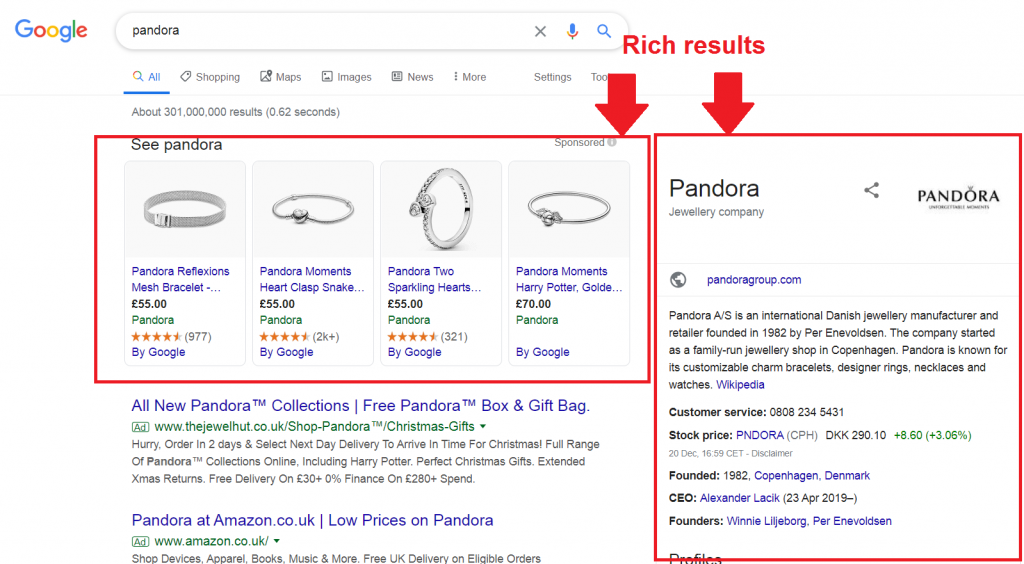If you’re running an eCommerce store, and you’re not utilizing schema to markup your website content, you’re missing out.
Schema – or ‘structured data’ – can help you to capture more of that all-important SERP real estate, improve your clickthrough rates, and ultimately drive more traffic to your website.
In this article, we’re going to introduce you to schema, explain the impact it can have on SEO, and walk you through the best practices for eCommerce sites.
Overview of schema
Schema is a structured data vocabulary that is used to organize and interpret the information on a webpage. Put more simply, it’s a piece of code that is added to your webpage to tell search engines like Google what the content on your website means.
It’s part of something called ‘semantic SEO’, which is the marketing technique of providing Google with metadata to help it to better understand the meaning behind the words on your page. In doing so, we help Google to more easily match it up to user search intent.
Marketers and webmasters can implement schema by adding ‘tags’ – snippets of code – to the HTML of their webpages through their content management systems. Schema.org helps with this by providing a shared vocabulary of tags and a markup tool.
For example, if your webpage features an ebook, you can use schema to add an “author” tag and show Google who the author is so that it can accurately display this in the SERPs.

We won’t go into detail on exactly how to use schema.org to markup your web pages here, but more information can be found on Schema.org.
Schema implications for SEO
So, why does it matter? Well, schema can help eCommerce stores with their SEO efforts in many ways, but most notably by making their website content eligible for inclusion in the ‘rich results’.
Rich results are special search result features and enhancements that appear in the SERPs. They often stand out and highlight extra information about what’s on your webpage than standard organic results.

When your pages are showcased in the rich results, they’re more visible and ‘clickable’ to searchers, which sends more traffic to your eCommerce store. But, in order to know what to show in the rich results, Google has to know what the content on your website means first, and it figures this out via schema.
Rich results can also help to boost both clickthrough rates and dwell time by making your webpage seem more authoritative and trustworthy to searchers, which can indirectly help you to rank higher in the organic listings.
Most important schema implementations for eCommerce stores
Now that you know what schema is and why it’s important, let’s talk about how eCommerce stores can utilize schema effectively.
The goal with schema is to markup the content that you want to get featured in the rich snippets. Our ecommerce SEO firm’s expert always suggest to setup the markup tags at least for the below sections for eCommerce stores.
Products
eCommerce stores sell products (duh!), so the most important implementation is to use schema to provide Google with information about each of your products so that they stand the best chance of appearing in the rich results.
This includes things like the brand, price, product name, availability, associated images, and product condition..

Reviews (Aggregate Ratings)
Equally important for eCommerce stores are reviews. Customers look for social proof before they make product purchases, and that proof often comes in the form of ratings. You can get star ratings to show up in the SERPs my marking up your pages using ‘aggregate ratings’. Don’t use the ‘critic reviews’ markup as this is for publishers.

Sitelinks Searchbox
The site links search box is a snippet that allows users to search within your site from Google, without clicking onto your webpage first. It looks like this.

When a user fills it in and searches, it sends them to a new page full of Google results that only includes pages from your domain.
What’s great about the site links search box is that it allows customers to quickly and easily search through your whole product catalog from within the search engine. It also takes up a lot of search real estate, which can help your website to stand out from other organic listings.
The only problem is that this rich snippet is only available to certain qualifying sites, those that see a high volume of brand search queries. If you’re one of them, make sure you add the relevant schema and get your own search box.
FAQs
Another way that eCommerce stores can dominate the SERPs is by adding FAQ schema. This can be introduced to any page that has a list of questions with answers. When effective, it grants you a table of FAQs below your webpage in the SERPs that searchers can click to find answers.

As you can see, it takes up huge amounts of vertical space so that searchers can’t miss it, plus it can answer their product questions before they land on your site, thus potentially boosting conversion rates.
We are digital marketing experts



